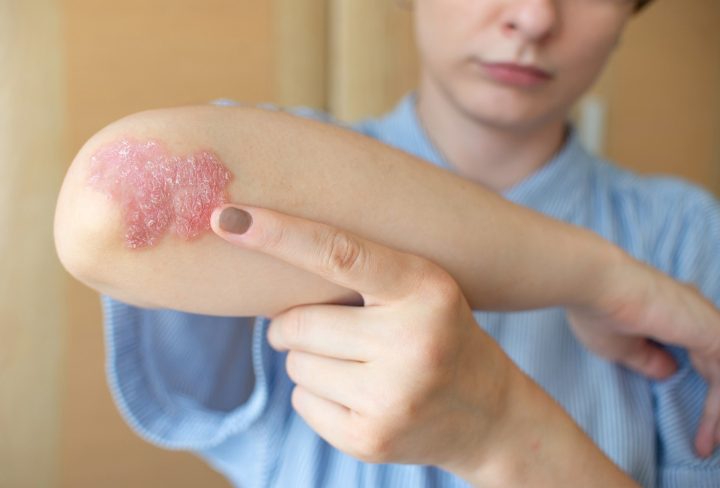Psoriasis is a skin disease that makes the skin cells abnormally multiply ten times faster than normal. It causes a rash with itchy, scaly patches, most commonly on the knees, elbows, trunk and scalp.
Types of Psoriasis
Plaque Psoriasis: This is the most common type of psoriasis, characterized by raised, red patches of skin covered with silvery-white scales. These patches can appear anywhere on the body, but they most commonly occur on the scalp, knees, elbows, and lower back.
Guttate Psoriasis: This type of psoriasis appears as small, drop-like lesions on the skin. It is most common in children and young adults and is often triggered by a bacterial infection such as strep throat.
Inverse Psoriasis: This type of psoriasis appears as bright red, smooth patches of skin that are often found in skin folds, such as under the arms, in the groin area, or behind the knees.
Pustular Psoriasis: This type of psoriasis is characterized by pus-filled blisters that appear on the skin. It can be localized to certain areas of the body or affect the entire body.
Erythrodermic Psoriasis: This is the least common but most severe type of psoriasis, characterized by widespread redness, itching, and peeling of the skin. It can be life-threatening and requires immediate medical attention.
If you think you may have psoriasis, it is essential to consult with a dermatologist for an accurate diagnosis and appropriate treatment.
Psoriasis Symptoms
The symptoms vary based on the type of psoriasis you have. Some common symptoms of plaque psoriasis (the most common variety of the condition) are:
- Raised patches of skin that appear red, brown, or purple
- Whitish-silver scales or plaques on the red patches or grey scales on purple and brown patches
- Dry skin associated with cracking and bleeding
- Soreness around patches
- Itching and burning sensation
- Thick, pitted nails
- Painful, swollen joints
Psoriasis Causes
The two factors that are believed to cause psoriasis are:
- The immune system: It is an autoimmune condition. Autoimmune conditions are the result of your body attacking itself (self-attack).
- Genetics: Some people inherit genes that make them more prone to develop psoriasis.
Risk Factors of Psoriasis
Common psoriasis risk factors include:
- An injury to your skin
- Excessive intake of alcohol
- Smoking
- Stress
- Hormonal changes
- Certain medications
- Immune diseases (HIV)
Diagnosis of Psoriasis
To diagnose psoriasis, your dermatologist will examine your skin, nails, and scalp for signs of psoriasis. The dermatologist will also ask if you have any:
- Symptoms like itchy skin
- Joint problems (pain and swelling or stiffness when you wake up)
- Blood relatives who have psoriasis
- Stress
Biopsy:
If your symptoms are not clear, or your dermatologist wants to confirm the diagnosis, they will take a small sample of your skin; this procedure is called a biopsy.
It is then sent to a lab for analysis. This biopsy examination can diagnose the type of psoriasis you have.
Psoriasis Treatment
The primary aim of psoriasis treatment is to stop the abnormal multiplication of skin cells and the removal of scales.
The treatment options include:
- Psoriasis creams and ointments
- Light therapy (phototherapy)
- Oral or injected medications
Prevention of Psoriasis
The best way to prevent or reduce the risk of spreading psoriasis is to avoid the triggers.
Check out some of the things you can do to prevent or reduce the risk of psoriasis flare-ups:
- Reduce your stress
- Avoid certain medications
- Prevent skin injuries
- Avoid infections (wash your hand frequently)
- Eat a healthy diet
Your dermatologist would help you deal with the symptoms. Contact for help!
Conclusion
Psoriasis is a chronic autoimmune skin disorder that affects millions of people worldwide. It can cause significant physical and emotional discomfort, and there is currently no cure for the condition. However, there are various treatments available that can help manage symptoms and improve quality of life. If you suspect you have psoriasis or are experiencing symptoms, it is important to see a healthcare professional for an accurate diagnosis and personalized treatment plan.
